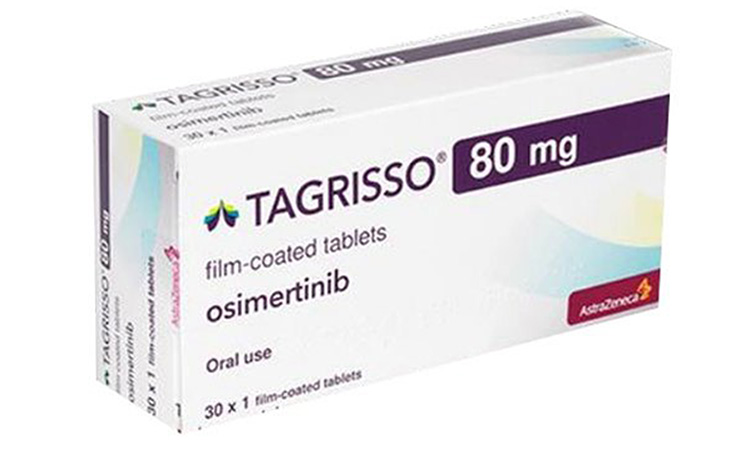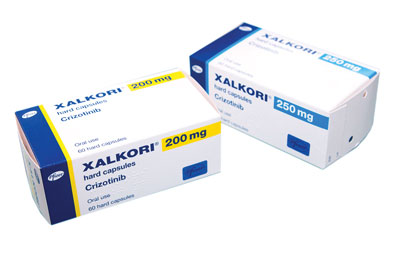Tagrisso (osimertinib) vs Xalkori (crizotinib)
Tagrisso (osimertinib) vs Xalkori (crizotinib)
Tagrisso (osimertinib) is a third-generation, irreversible EGFR tyrosine kinase inhibitor specifically designed to treat non-small cell lung cancer (NSCLC) with certain EGFR mutations, and it has shown effectiveness against both primary and resistance mutations. Xalkori (crizotinib), on the other hand, is a first-generation ALK and ROS1 tyrosine kinase inhibitor used to treat NSCLC that is positive for ALK or ROS1 mutations, not typically effective against EGFR mutations. The choice between Tagrisso and Xalkori would depend on the specific genetic alterations present in an individual's NSCLC, as determined by molecular testing, and the decision should be guided by a healthcare professional who can evaluate the patient's unique condition and mutation profile.
Difference between Tagrisso and Xalkori
| Metric | Tagrisso (osimertinib) | Xalkori (crizotinib) |
|---|---|---|
| Generic name | Osimertinib | Crizotinib |
| Indications | Non-small cell lung cancer (NSCLC) with specific EGFR mutations | NSCLC, ROS1-positive, and ALK-positive metastatic NSCLC |
| Mechanism of action | EGFR tyrosine kinase inhibitor | ALK and ROS1 tyrosine kinase inhibitor |
| Brand names | Tagrisso | Xalkori |
| Administrative route | Oral | Oral |
| Side effects | Diarrhea, rash, dry skin, nail toxicity, stomatitis | Visual disorders, gastrointestinal effects, edema, elevated transaminases |
| Contraindications | Hypersensitivity to osimertinib or excipients | Hypersensitivity to crizotinib or any component of the formulation |
| Drug class | EGFR inhibitor | ALK and ROS1 inhibitor |
| Manufacturer | AstraZeneca | Pfizer |
Efficacy
Tagrisso (Osimertinib) Efficacy in Lung Cancer
Tagrisso (osimertinib) is a third-generation, irreversible epidermal growth factor receptor tyrosine kinase inhibitor (EGFR TKI) that has shown significant efficacy in the treatment of non-small cell lung cancer (NSCLC) with specific EGFR mutations. Clinical trials have demonstrated that osimertinib is effective in patients with NSCLC harboring EGFR T790M mutations, which are a common cause of resistance to earlier-generation EGFR inhibitors. In the AURA3 study, osimertinib significantly improved progression-free survival (PFS) compared to platinum-based chemotherapy in patients with T790M-positive advanced NSCLC who had disease progression after first-line EGFR-TKI therapy.
Furthermore, the FLAURA trial investigated osimertinib as a first-line treatment for NSCLC with EGFR mutations. In this study, osimertinib showed a greater PFS compared to standard EGFR-TKIs (gefitinib or erlotinib). Additionally, osimertinib has been associated with a higher objective response rate (ORR) and a longer duration of response (DoR) than earlier-generation EGFR-TKIs. Its efficacy, along with a favorable safety profile and the ability to cross the blood-brain barrier, makes osimertinib a valuable treatment option for patients with advanced EGFR-mutated NSCLC.
Xalkori (Crizotinib) Efficacy in Lung Cancer
Xalkori (crizotinib) is a first-generation anaplastic lymphoma kinase (ALK) inhibitor used to treat NSCLC patients whose tumors are ALK-positive. Crizotinib has shown high efficacy in shrinking tumors in patients with ALK-positive NSCLC. The PROFILE 1014 study compared crizotinib with chemotherapy in previously untreated advanced ALK-positive NSCLC and found that crizotinib significantly improved PFS. The ORR was also higher with crizotinib than with chemotherapy, indicating a robust response to the drug in this patient population.
Crizotinib has also been effective in patients with ROS1-positive NSCLC, which is another genetic alteration that can be targeted with this medication. In clinical trials, patients with advanced NSCLC harboring ROS1 rearrangements treated with crizotinib had a high ORR and experienced a prolonged PFS. The efficacy of crizotinib in ALK-positive and ROS1-positive NSCLC makes it a cornerstone in the management of these genetically defined subtypes of lung cancer. However, resistance to crizotinib can develop, and second-generation ALK inhibitors may be required for continued disease management.
Regulatory Agency Approvals
Tagrisso
-
European Medical Agency (EMA), European Union

-
Food and Drug Administration (FDA), USA

-
Health Canada

-
Therapeutic Goods Administration (TGA), Australia

-
Medsafe (NZ)

Xalkori
-
European Medical Agency (EMA), European Union

-
Food and Drug Administration (FDA), USA

-
Health Canada

-
Pharmaceuticals and Medical Devices Agency (PMDA), Japan

-
Therapeutic Goods Administration (TGA), Australia

Access Tagrisso or Xalkori today
If Tagrisso or Xalkori are not approved or available in your country (e.g. due to supply issues), you can access them via Everyone.org.
How it works

Make an enquiry
Choose the medicine you want to buy, answer a couple of questions, and upload your prescription to speed things up. We’ll get back to you within 24 hours.


Make an enquiry
Choose the medicine you want to buy, answer a couple of questions, and upload your prescription to speed things up. We’ll get back to you within 24 hours.


Breeze through the paperwork
We'll guide you through the required documents for importing unapproved medicine, ensuring you have all the necessary information.


Get a personalized quote
We’ll prepare a quote for you, including medicine costs and any shipping, administrative, or import fees that may apply.


Receive your medicine
Accept the quote and we’ll handle the rest - sourcing and safely delivering your medicine.

Some text on this page has been automatically generated. Speak to your physician before you start a new treatment or medication.
Let's talk
If you have any questions, call us or send us a message through WhatsApp or email:
Contact us




